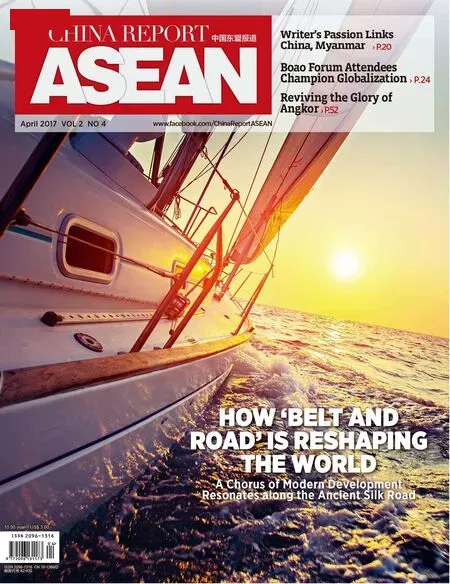Bank of China as A Matchmaker
By Wang Zhe
Bank of China as A Matchmaker
By Wang Zhe
The world's fourth largest bank's events to bring Chinese and foreign companies together have proven a huge success
On March 18, at a meeting sponsored by the Bank of China (BOC), 320 small and mediumsized businesses from China met 350 of their Philippine counterparts at the Manila Grand Hotel to look for potential partners in investment and trade.
The fourth largest bank in the world, the BOC is trying to strengthen the economic relations between China and the Philippines by bringing together the small and medium-sized firms of the two countries.
Banking Bridge
“Our cooperation with Philippine small and mediasized enterprises aims to promote the development of our business in the country and increase links with global markets,” said Deng Jun, president of the BOC branch in the Philippines. “By accelerating the cooperation between the small and medium-sized companies in the two countries, we hope to enhance the growth of trade cooperation.” Deng believes that Philippine small and medium-sized companies are facing a situation dif f erent than that of their Chinese counterparts. He hopes companies from both sides can benefit from the bank’s matchmaking procedures.
According to the Philippine Department of Statistics, the country has 91,169 small and medium-sized companies, accounting for more than 2.51 million jobs or 32 percent of the country’s total employment. However, such enterprises have limited opportunities to gain investment, technology and market access. Deng said that small and medium-sized enterprises have played an important role in promoting local economic growth, but have faced many difficulties in receiving financing from banks. The BOC expects to serve as the bridge between the markets of two nations.
“It is hard for small and medium-sized enterprises to find foreign partners,” Deng added. “We hope to help those companies find opportunities in China and across the world. Philippine small and mediumsized companies can apply to us to be matched with Chinese counterparts. Once the right match is found, we can connect them.”
Last October, Philippine President Rodrigo Duterte visited the head office of the BOC in Beijing. He was present as the BOC, the Philippine Department of Trade and Industry, the Philippine Chamber of Commerce and the Philippine branch of the International Chamber of Commerce signed the Strategic Cooperative Agreement on Promoting the Cross-border Trade and Investment of Small and Medium-sized Enterprises in China and the Philippines. In order to implement the agreement, with the help of all parties concerned, the BOC organized the get-together meeting of Chinese and Philippine enterprises.
Deng believes that in its role as a hub along the Belt and Road, the Philippines has reason to expect greater access to development opportunities. This meeting is also an important BOC step to support the Belt and Road Initiative and to pursue the aim of being “a top bank taking on its social responsibilities.”

Deng Jun (second left), president of the BOC branch in the Philippines.
Small and medium-sized enterprises have played an important role in promoting local economic growth, but have faced many difficulties in receiving financing from banks.
Deng revealed that with the advance of the Belt and Road Initiative, more Chinese enterprises, especially small and medium-sized ones, intend to begin operations in countries along the Belt and Road. Since 2014, the BOC has begun to provide matchmaking services for small and mediumsized enterprises planning to invest and trade overseas. It has held 28 meetings of this kind globally, which have attracted 15,000 companies from home and abroad, covering high-end manufacturing, environmental protection, information technology, education, healthcare, modern agriculture, food processing, mechanical equipment, chemicals and the automobile industry. Through more than 10,000 “one-onone” meetings, more than 5,000 tentative agreements have been reached, of which 2,000 have already been carried out.
Great Benefits
Tourist agency Hopping Buddies is one of the Philippine companies that has joined such meetings. Kristof f er Dela Cruz, the agency’s vice president for sales and marketing, mentioned that his company hopes to enter the Chinese market. In 2016, China’s overseas tourists took 100 million trips abroad, but the Philippines accounted for only one percent of that total. In fact, the distance from the Philippines to China’s major cities is just two or three hours by plane. Therefore, with an eye toward the Chinese market, Philippine tourism has great potential.
“We greatly welcome the kinds of services that the BOC has provided to us,” Dela Cruz said. “The matching procedures give us the chance to meet our potential partners, clients and agencies. It is difficult for us, a small company, to find the right overseas partners, who are also clients of the BOC. And we don’t have to spend a lot of money to attend a tourism expo abroad anymore. We hope we can find more appropriate partners at the next meeting at the end of this year.”
Zhou Zijuan of the Qimei Agricultural Science and Technology Company, based in China, hopes to expand his company’s operations in the Philippines. Like Hopping Buddies, Qimei welcomes the matchmaking services of f ered by the BOC.
“We are glad that we can run our business with the help of the BOC,” Zhou said. “Such guidance can provide us with excellent expertise. The tropical climate of the Philippines is favorable for fruits and vegetables. We are confident that we can introduce our organic vegetable production technology into the country.”
Qimei has signed cooperative agreements with more than 3,500 farmers in Hebei, a northern Chinese province which surrounds Beijing. The enterprise has received many third-party organic certificates including those of the United States, Europe, Canada, Japan and China.
According to Deng, an even greater number of small and medium-sized enterprises are set to join the next matchmaking meeting, scheduled for November. Their businesses range from food processing to furniture manufacturing, agriculture, fisheries, e-commerce, telecommunications, construction, building materials, equipment manufacturing, steel, tourism and real estate.

